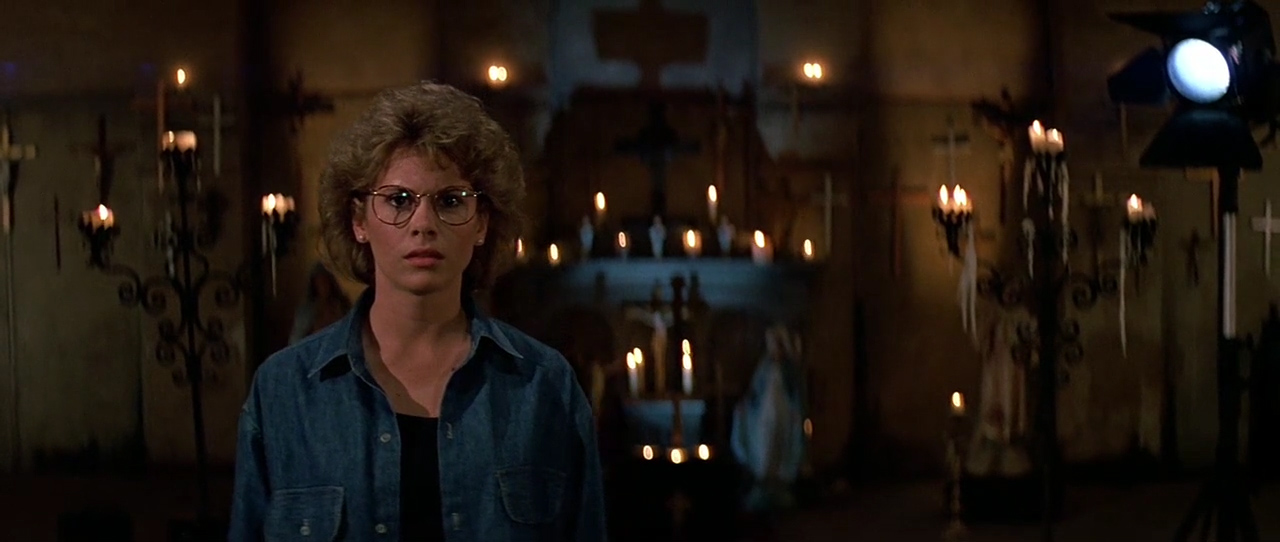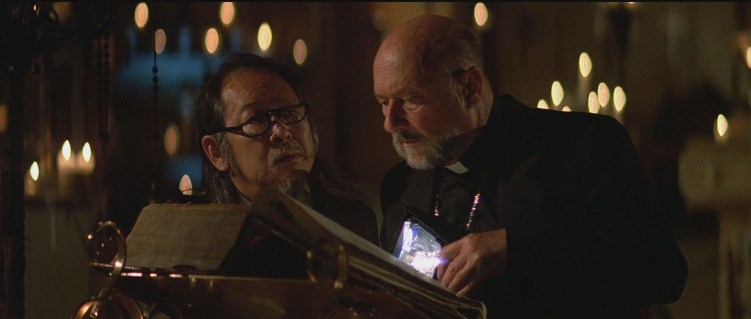
Podcast (horrorbusiness): Play in new window | Download
Subscribe: RSS
Episode X: Are You There God? It’s Us, Horror Business
Greetings, goofs, weirdos and creepy crawlers, and welcome back to Horror Business, the podcast that will not be threatened by a walking meatloaf. We have got an amazing episode for you this time, and not only because we’re now in double digits, but because this episode we have our first guest, Lehigh Valley horror aficionado and all around great guy Albert Martin! How awesome is that?! Don’t answer that please. We KNOW how awesome it is.

This episode, we tackle the concept of religious horror, but not the classical idea of “religious” horror. Instead of the classics like The Exorcist, The Omen, and Rosemary’s Baby, we chose to deal with two films that instead tackle evil as an objective and abstract concept: 2015’s Baskin and 1987’s Prince Of Darkness.
We start by talking with Albert about his personal background in the horror genre, some of his favorite films, and his personal hobby of collecting horror and other genre merchandise. The appeal of horror films, specifically the sense of comfort and safety, is discussed. We have a side discussion on the value of collecting merchandise, the virtue of being able to find collectible items, and Liam’s woefully small comic book collection. We give a less than enthusiastic review of Lights Out and the Mansfield Cinepolis, and discuss the unique nature of 1997’s Event Horizon as it relates to the topic of this episode of religious horror. We give the Netflix original series Stranger Things a glowing and stellar review. Justin briefly talks about his inability to really invest in the classic religious horror movies due to their using God as a protagonist and his childhood upbringing in a religion that portrayed God as ultimately good and ultimately powerful versus a fallible and not ultimately powerful devil.


Our discussion of Prince Of Darkness begins with talking about how it is one of the lesser known John Carpenter films. Carpenter’s attempt at taking metaphysical concepts and making them physical concepts by explaining them away with quantum physics as a possible shortcoming is discussed, as is Carpenter’s stereotypical characterization of the protagonists as far too arrogant and faithful to science being a possible shortcoming of the film. Albert points out that a possible failure of the film on an initial viewing is that it lacks a central antagonist, as many great horror movies do, and that Carpenter’s attempt at reaching for abstract concepts might be a strength. He discusses the focal point of Carpenter’s “Apocalypse Trilogy” (The Thing, The Mouth Of Madness, and Prince Of Darkness) being destruction, with each movie focusing on the destruction of a different concept. He argues that Prince Of Darkness is not about the destruction of religion and god but rather the destruction of our concept of the order of reality, as the movie is actually about science failing to explain a concept religion has already explained. The horror of a basic understanding of quantum physics and the uncertainty it promotes is discussed. Liam also argues that the movie is not anti-religion, but rather it deals with the idea of how at a “higher level of science, something vaguely religious happens.” He further goes on to argue that religious fear is more about an inner fear rather a fear of something external, and that this is the point that Carpenter is trying to make: he is using a fear that there might be something sentient behind the chaos of every day life as a protagonist. Liam and Justin both point out that much of the horror in the film come from the film’s refusal to conform, and then proceed to rightfully point out that Donald Pleasance is a jerkoff in this film. Liam then proceeds to blow Justin’s mind by revealing the real purpose of the dream sequence in the movie, and how that dream sequence is focal to the true grimness of the movie in that it reveals that the protagonists are ultimately hopeless. We again discuss the nature of religious apocalyptic films and how they fall short of actually being horror because ultimately they rely upon a narrative where God triumphs over evil. Justin compares such an idea as going to a Harlem Globetrotters game and being afraid the Globetrotters are going to lose. Liam argues that Prince Of Darkness isn’t a religious horror film because it lacks the anxiety on religion that many religious horror films have but instead relies upon an anxiety born of science failing. Justin points out that most of the religious concepts are in the visuals only, and Albert argues that ultimately Carpenter was critiquing human perceptions of reality, be they religious or scientific. Liam concedes that the lofty ideas of the film may or may not simply be a vehicle for horrific imagery. Albert argues that the true horror of this film is not in the visuals but rather the discussions between the characters on the nature of reality. There is more discussion of Donald Pleasance’s less than amazing performance occurs and how it makes an already unlikeable character even more unlikeable. We end the review by wholeheartedly recommending the movie for anyone who hasn’t seen it, even though we’ve already ruined it for you.


Up next, we discuss the 2015 Turkish film Baskin. We open up the discussion by pointing out that we chose this film specifically because it was a non-Western and non-Christian film that dealt with things of the religious nature. The idea that Baskin is a religious movie based mostly on it being something of a morality tale is discussed. The slippery nature of the film, in that it is difficult to tell what is actually real and what is all in the characters heads, is examined. The brilliance of the actor portraying the character of ‘Papa’ is examined. (Sidenote: I, Justin, would like to apologize for not realizing this actor actually wore no makeup and his appearance is the result of a disease.) Papa’s role in injecting religious morality into the movie is discussed. The idea of people creating their own personal hell that they carry within themselves is examined. The bizarre and unsettling religious imagery of the film is discussed at length. The tendency of films to describe hell as “not a very solid experience” and something difficult to grasp is briefly talked about. Albert talks about the film challenging Western concepts of hell, in that Western beliefs rely upon people going to hell because they deserve hell, whereas the people in the film despite not being ideal citizens are far from deserving of the punishment we see them endure. Likewise, Albert argues that the true horror of the film comes from the idea that sometimes we are subject to a punishment we don’t deserve, as he claims the people in the movie are going through. Liam wonders aloud if the film functions as more of a fairy tale than a religious story, and Justin points out that contrary to the film’s tagline (“Five cops go to hell”) the film feels like we are watching something “real” as opposed to something occurring in an alternate reality. The surreal imagery of the movie is discussed. The weakness of the ending is examined, with the conclusion being that it felt forced and weak. Albert argues that the ending is the true definition of hell, in that it is a character forced to witness his own demise over and over again while being helpless to change course to avoid it. He points out that this character is forced to do this because he does not release his sin, as opposed to the character who dies shortly before a tarantula crawls out of his mouth which symbolizes his sin being released after he embraces the fact that he was flawed. The message of the film being superficial and not deep at all is discussed.


As always thanks to everyone and anyone who checked this episode out, or shared a tweet/shared a post on FB/gave us love by recommending us to someone. We love you forever for listening. Any questions, comments, suggestions for movies and guests, or if you yourself want to join us for a movie viewing or even an episode, can be sent to [email protected]. Thanks again to Justin Miller and Doug Tilley for their technical contributions, and also thanks to Josh “Basketball Jones” Alvarez for the theme song, and HUGE thank you to the wonderful and delightful Albert Martin for appearing on this episode and putting up with our nonsense. Follow us on Twitter at @thehorrorbiz666, like us on Facebook , and remember to rate, review, and subscribe to us on ITunes! Thanks!






